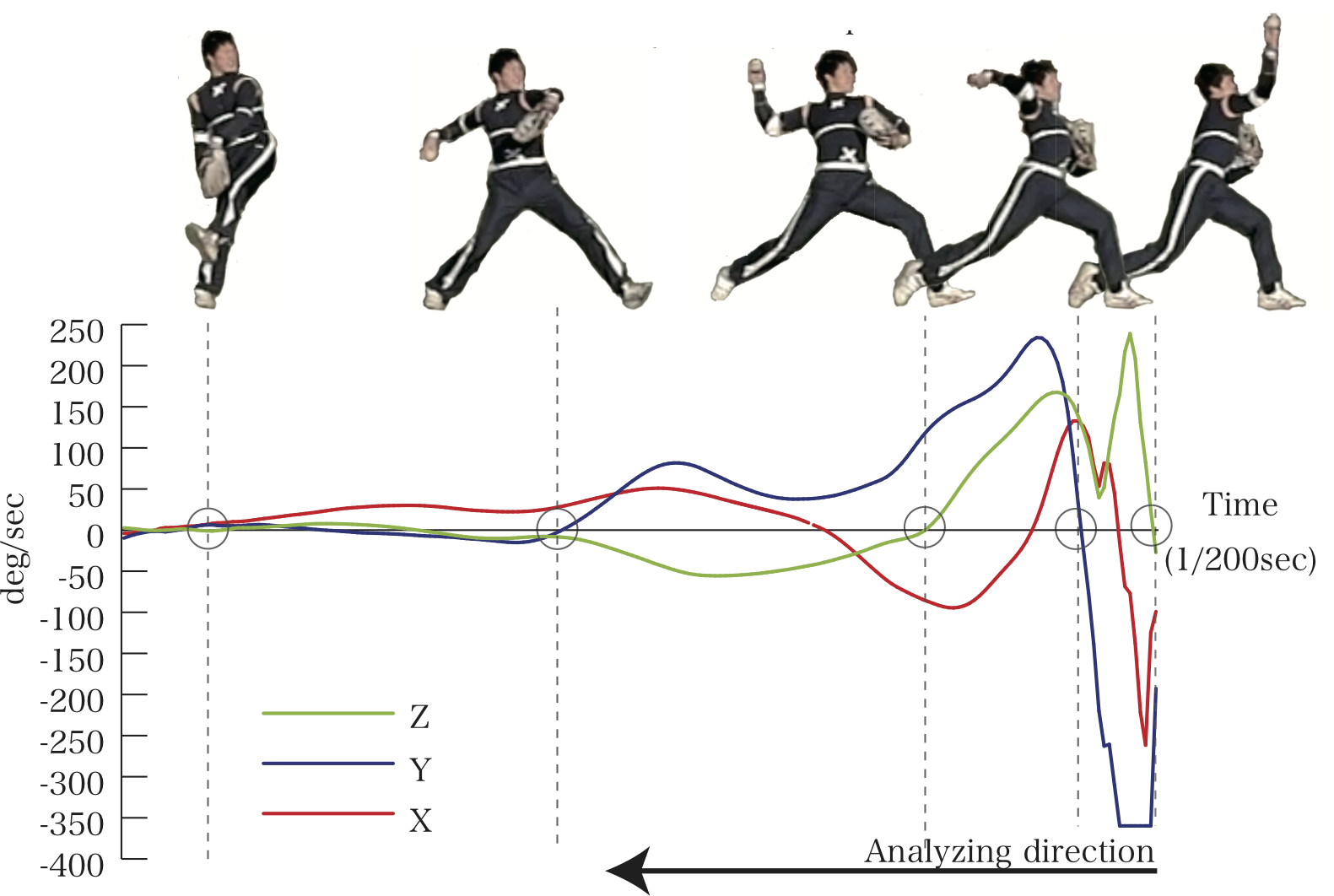Research Topic
- Context-aware technologies and systems
- Passive mobile and wearable sensing and its platforms
- Human behavior change and intervention methods
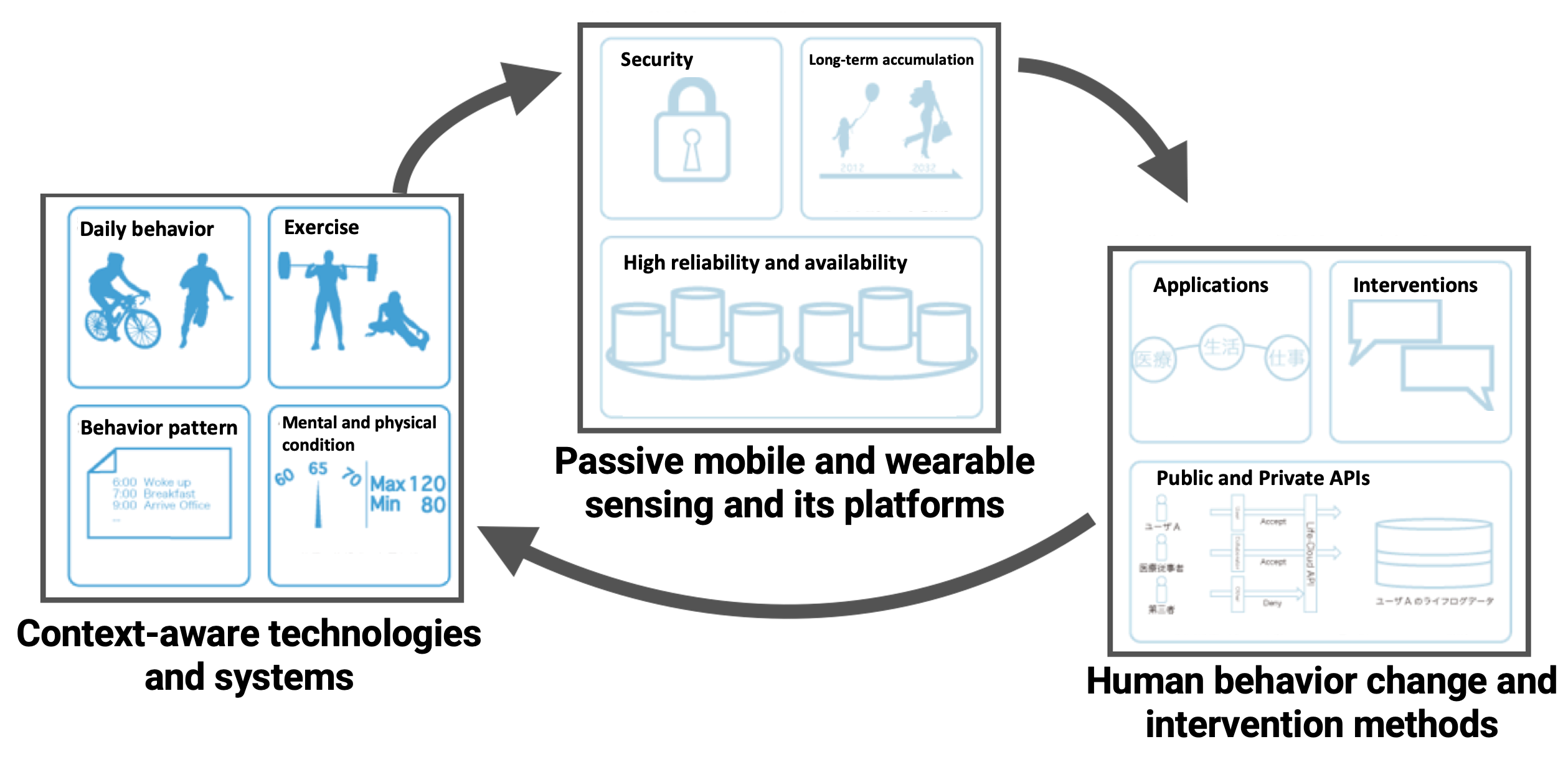
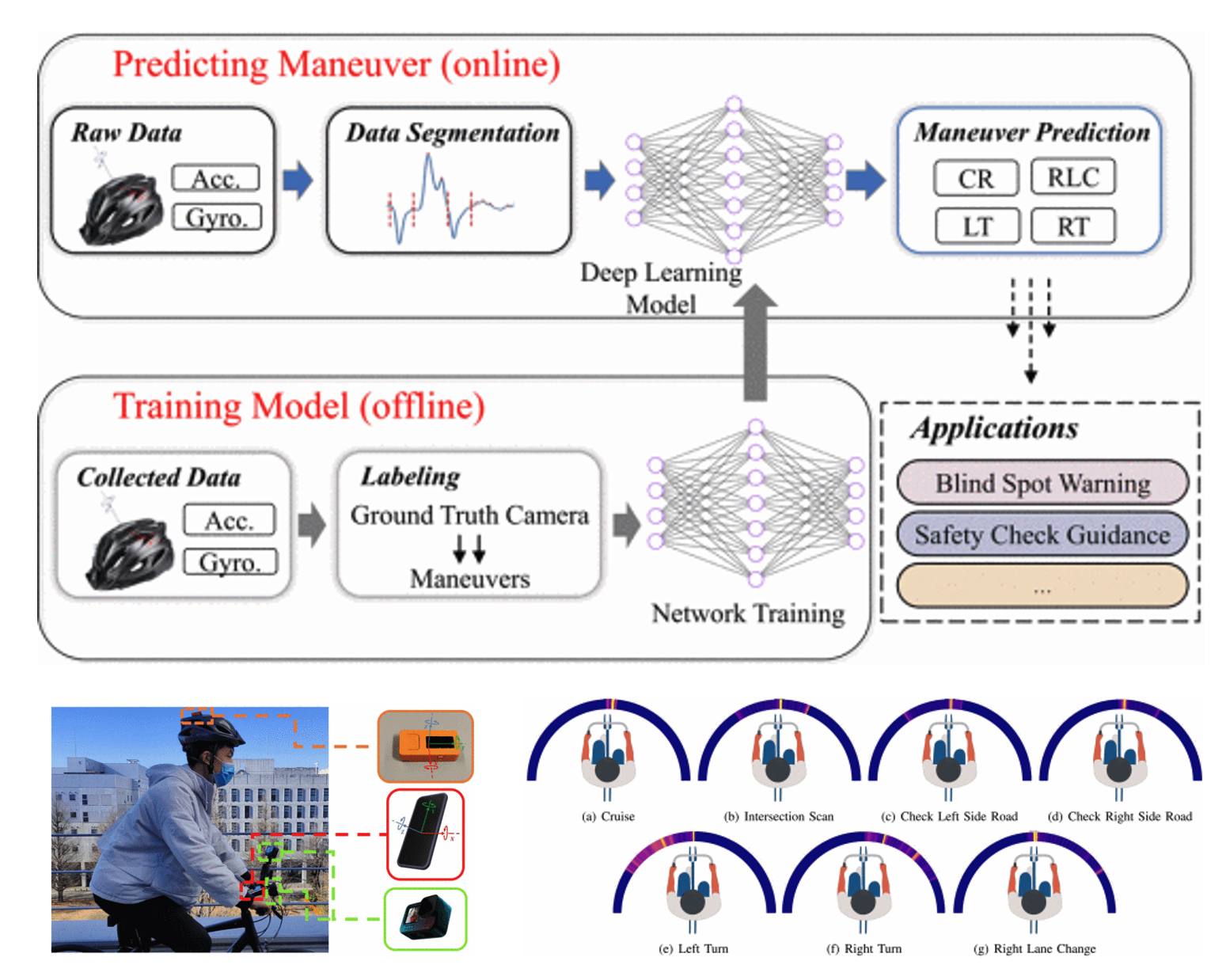
Context-aware technologies and systems
- Technology for recognizing and predicting the behavior of micro-mobility riders to improve the safety of micro-mobility: HeadSense, HeadMon, and DoubleCheck.
- Detection technology of infant/toddler behavior and parenting behavior related behaviors to support child-rearing
- Methods of detecting infection prevention behavior (i.e., hand-washing, mask-usage, and conversation events) using consumer devices
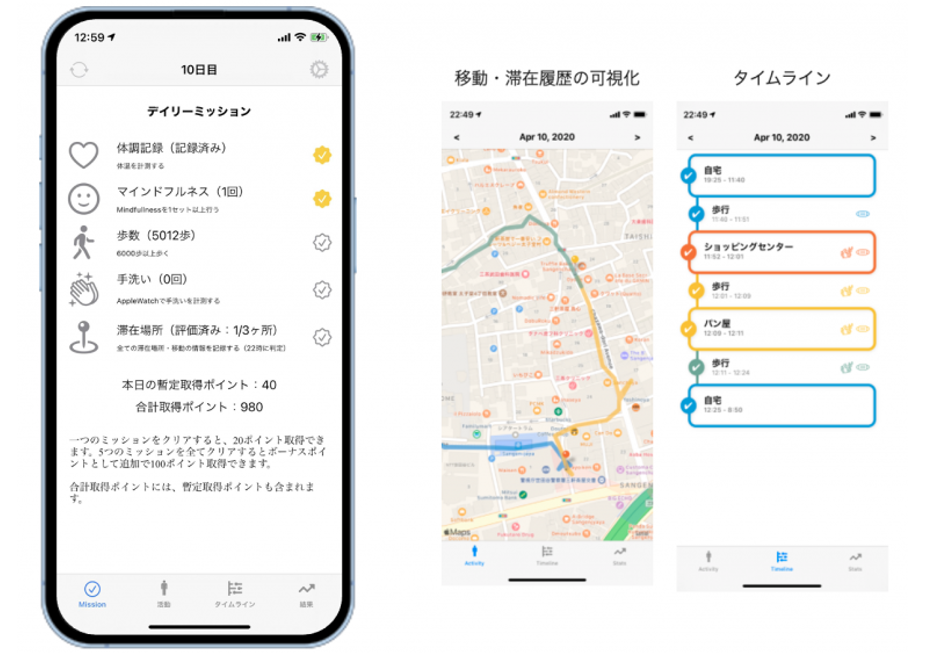
Passive mobile & wearable sensing and its platforms
- Postpartum depression detection using passive sensing technology
- Development of information platform for improving the performance and condition of athletes using mobile/wearable devices: Athlete-Life, MiQ, and Ripken.
- Open-source passive mobile/wearable sensing platform (mainly iOS, watchOS, and Android): AWARE, Senbay, SelfGuard and MOCHA
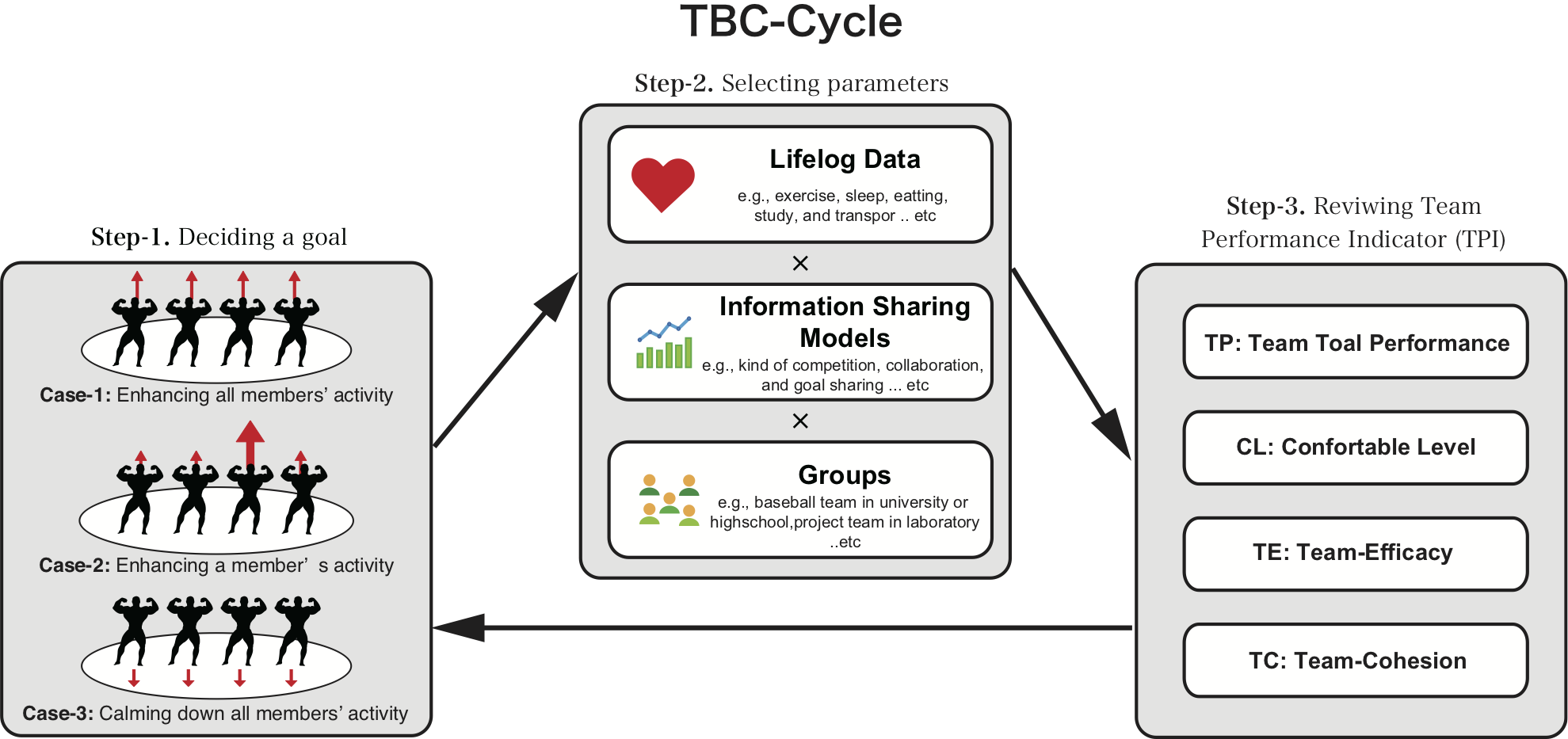
Human behavior change and intervention methods
- Platform for promoting team-level behavior change using competitive and cooperative lifelog sharing
- Investigation of the impact of the way incentives are offered on infectious disease prevention behavior
Current Projects
A-UVI: GNSS-Assistend UV Index Estimation Method
- [ACM IMWUT (UbiComp) ’25] A-UVI: GNSS-Assisted EO-based UV Index Estimation Method for Individual-level Precise UV Exposure Assessment
- [ACM MobiSys ’24 (Poster)] Towards Estimating UV Index with a Smartphone Utilizing GNSS Signals as a Point Cloud
- [ACM SenSys ’22 (Poster)] UV index estimation leveraging GNSS sensors on smartphones
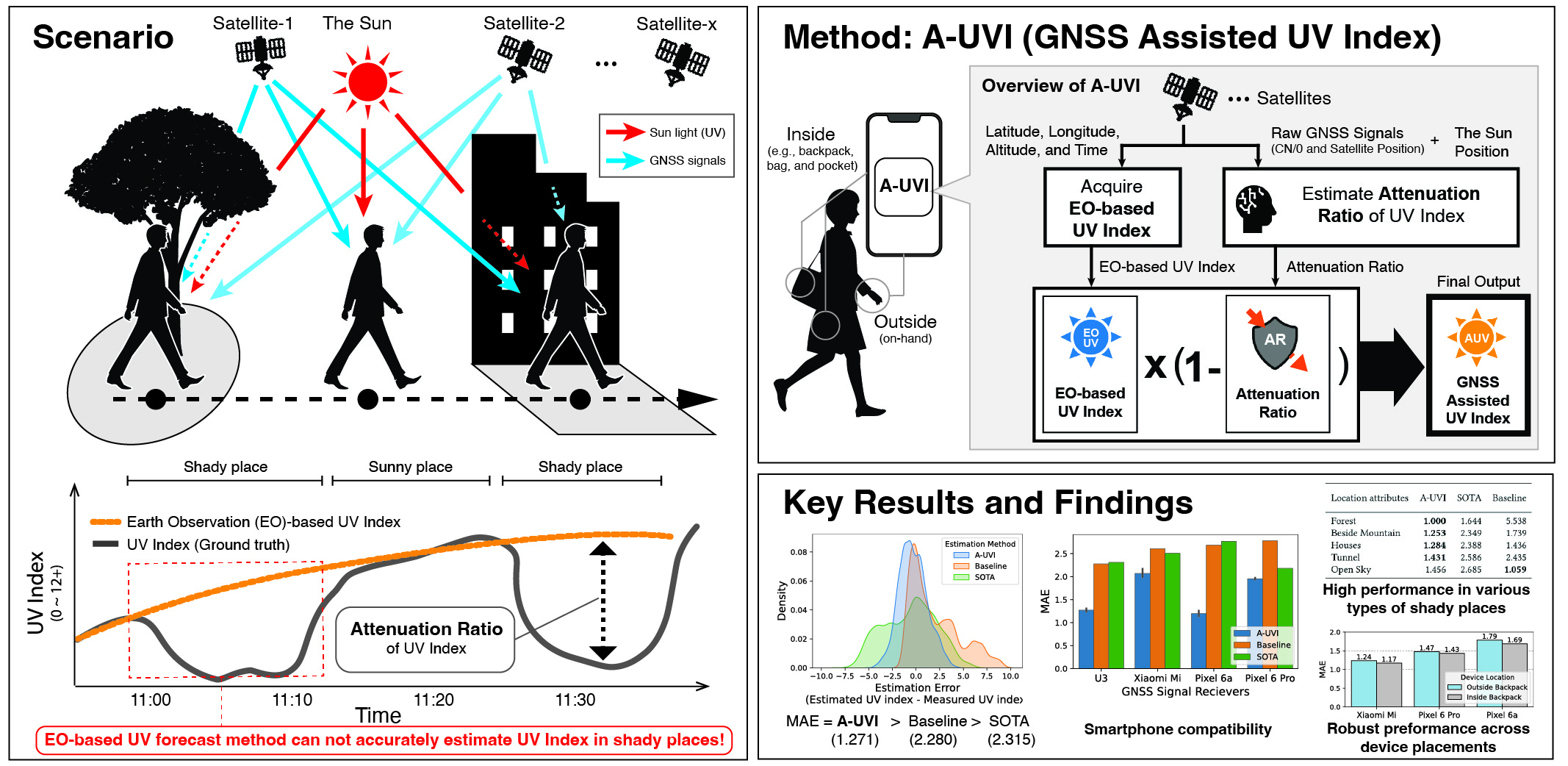
Detecting & predicting micro-mobility riders' behaviors
Although micro-mobility (e.g., sharing bikes, scooters, and other mobilities) brings convenience to modern cities, they also cause various social problems, such as traffic accidents, casualties, and substantial economic losses. Our research is focused on detecting and predicting the driving behavior of those mobility users using consumer devices.
- [IEEE Transactions on Mobile Computing] HeadMon+: Domain Adaptive Head Dynamic-based Riding Maneuver Prediction
- [IEEE ICDCS ’24] RideGuard: Micro-Mobility Steering Maneuver Prediction with Smartphones
- [IEEE PerCom ’23] HeadMon: Head Dynamics Enabled Riding Maneuver Prediction
- [IEEE WoWMoM ’23] HeadSense: Visual Search Monitoring and Distracted Behavior Detection for Bicycle Riders
- [IEEE SMC ’22] DoubleCheck: Single-Handed Cycling Detection with a Smartphone
- [IEEE ITSC ’21] MiMoSense: An Open Crowdsensing Platform for Micro-Mobility
Earable computing and systems
Earable devices, represented by fully wireless earphones, have spread rapidly in recent years. These devices are equipped with rich computational resources, sensors and communication capabilities that can be applied to advanced sensing tasks. Our research group is developing user interfaces and optimising interrupt timing using the earable device infrastructure.
- [ACM UbiComp ’24 (Poster)] Investigating Acceptable Voice-based Notification Timings through Earable Devices: A Preliminary Field Study
- [ACM CHI ’24] ReHEarSSE: Recognizing Hidden-in-the-Ear Silently Spelled Expressions
Augmenting childcare environment
Since the childcare environment has significantly changed, improving and supporting childcare have become major challenges in current society. Automatically recording and subsequently observing childcare activities can be used for various purposes to support childcare. However, methods to detect childcare activities using off-the-shelf devices have not yet been proposed. This study develops a method to detect childcare activities that parents perform for their babies using an off-the-shelf wearable device.
- [IEEE Pervasive Computing Magazine] Multi-label Classification Model for Infant Activity Recognition Using Single Inertial Sensor
- [ACM ICMI ’23 (Poster)] Assessing Infant and Toddler Behaviors through Wearable Inertial Sensors: A Preliminary Investigation
- [IEEE SmartComp ’22 (Poster)] Detecting Childcare Activities Using an Off-the-shelf Smartwatch
- [ABC ’22] Preliminary Study for Classifying Baby Stroller-related Parenting using Smartphones
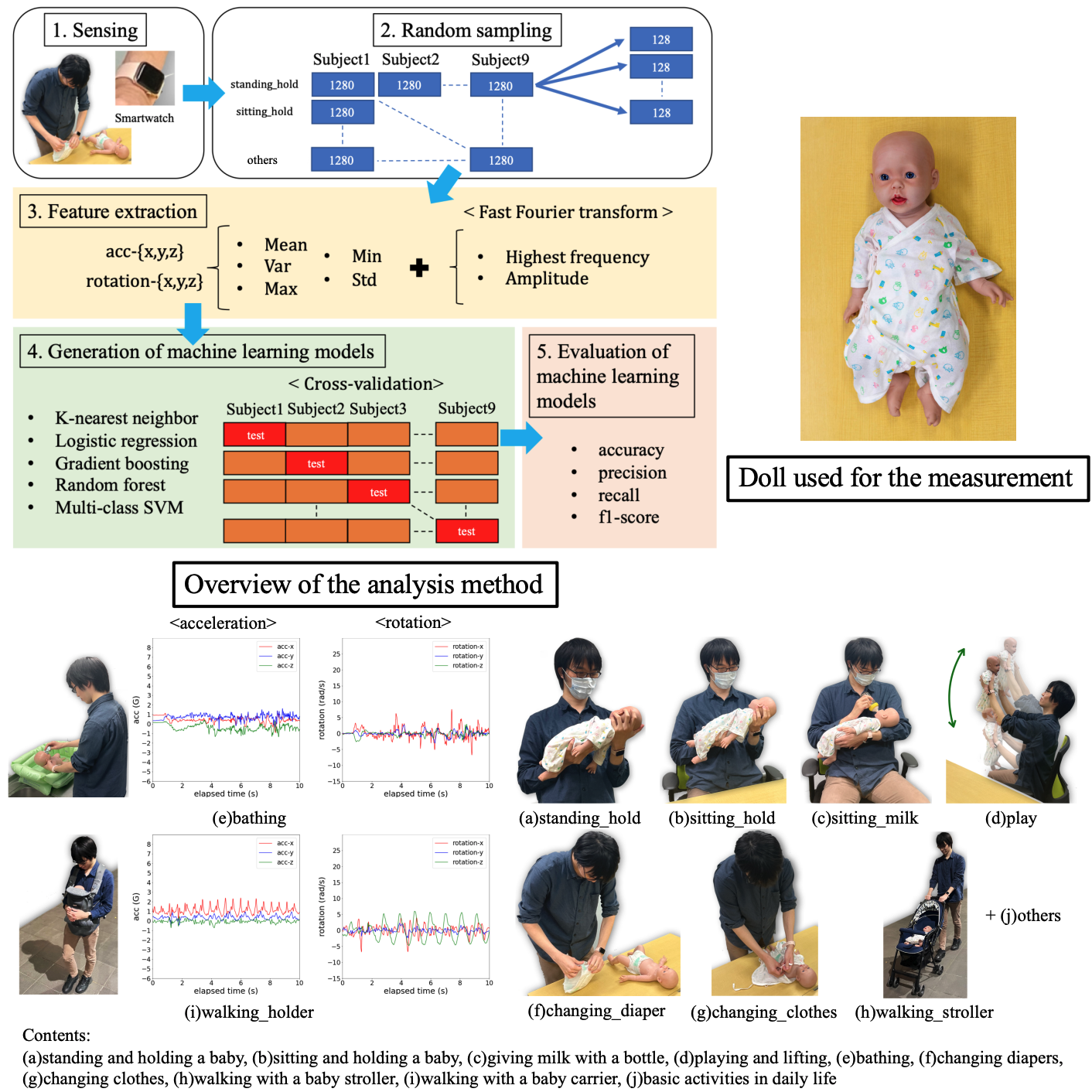
AthleteLife: Encouraging athletes' skills, physical, and mental condition
Sensors in smartphones and wearable devices could help athletes keep track of their condition and performance. In this research, we are working with a team of student-athletes to research and develop a data collection and reduction platform to realize these goals. In particular, we are researching a platform for collecting sensory information from athletes and a platform for estimating their condition using passive mobile sensing technology.
- [ACM UbiComp ’24 (Poster)] Toward Detecting Student-Athletes’ Condition Using Passive Mobile and Wearable Sensing
- [ACM UbiComp ’21 (Poster)] Experience Sampling Tool for Repetitive Skills Training in Sports Using Voice User Interface
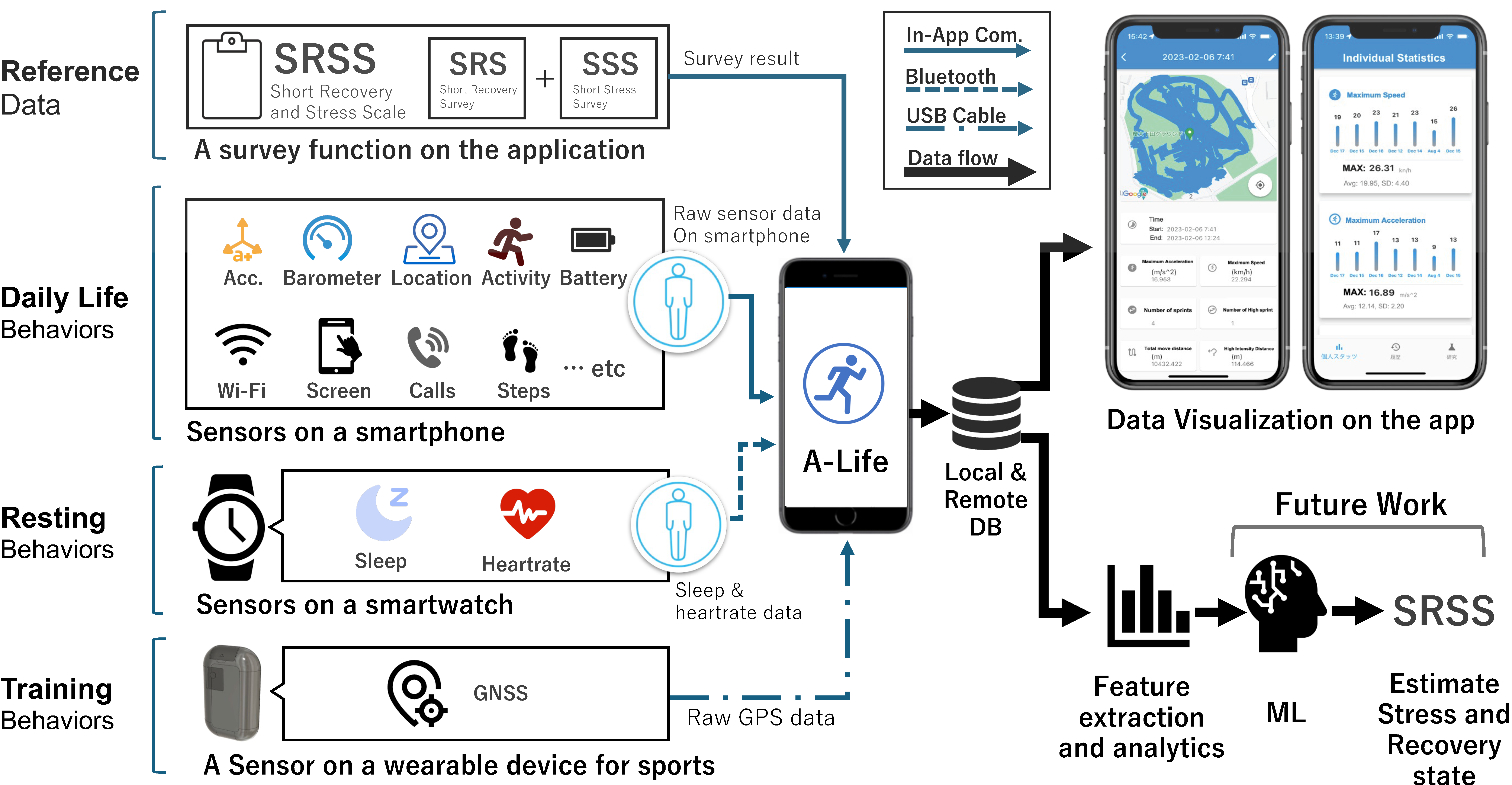
City-scale traffic behavior analysis and simulation
Understanding city-scale traffic behavior leads to traffic optimization. In particular, we are optimizing the rearrangement of micro-mobility, which has rapidly spread in recent years, and estimating the amount of greenhouse gas emissions.
- [Sustainable Cities and Society] Assessing environmental benefits from shared micromobility systems using machine learning algorithms and Monte Carlo simulation
- [SIGSPATIAL ’22] A plug-in memory network for trip purpose classification
- [IEEE ITSC ’21] An Unsupervised Learning-based Approach for User Mobility Analysis of E-Scooter Sharing Systems
- [IEEE IGESSC ’21] Estimation of Greenhouse Gas Emission Reduction from Shared Micromobility System
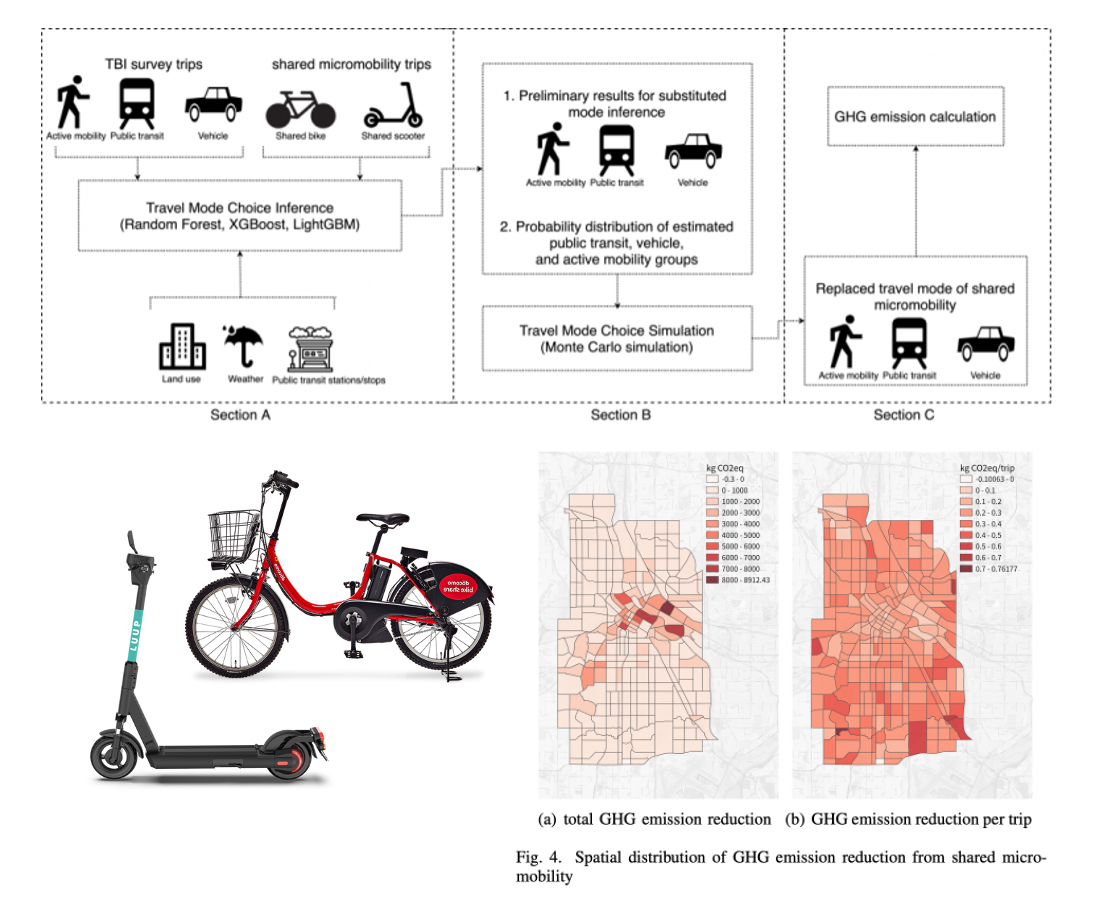
Student life support and encouragement platform
The COVID-19 pandemic has had a significant impact on students’ life patterns. At the same time, universities and other service providers are required to ensure a different kind of safety in the with- and post-COVID era. Our team is using mobile passive sensing to analyze students’ behavior patterns during the COVID-19 pandemic and to develop systems to support student life in/after the pandemic.
- [ACM CHI ’24] AEDHunter: Investigating and Enhancing AED Retrieval through a Mobile Application
- [ACM MobiHoc (MobiCOVID) ’22] MOCHA: Mobile Check-in Application for University Campuses Beyond COVID-19
- [IPSJ Journal] Physical Activity Analysis of College Students during the COVID-19 Pandemic Using Smartphones
- [IPSJ Journal] SFC GO: Online Physical Education Communications Support System
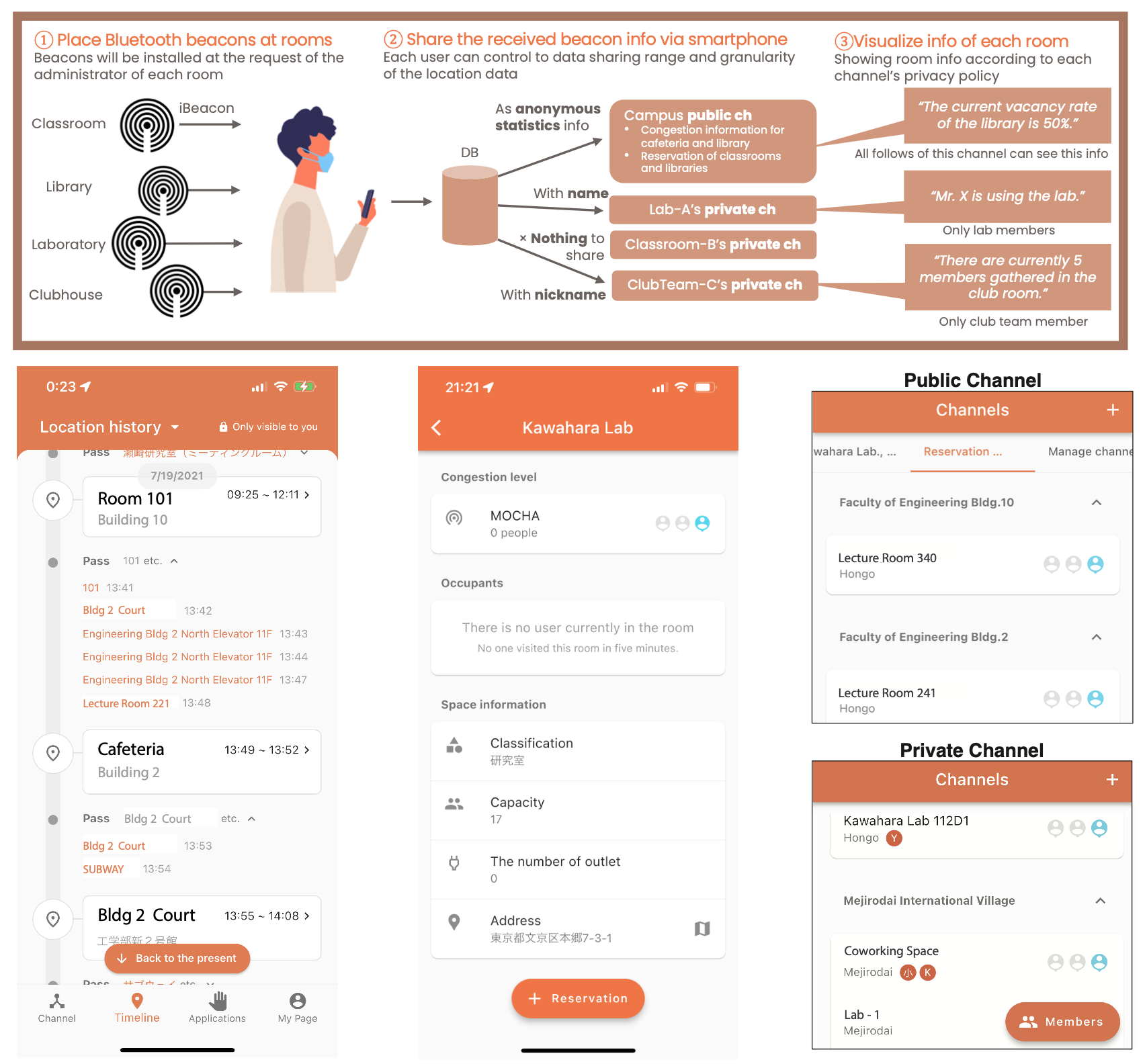
Passive mobile & wearable sensing framework
AWARE is an open-source sensing framework that passively collects sensor data from multiple hardware, software, and human sensors installed in smartphones. AWARE is actually used in over 200 academic papers and services. I am primarily responsible for development and support of iOS, macOS, and watchOS versions.
- [ACM UbiComp ’23 (Mental Health S&I)] Smartwatch-Based Sensing Framework for Continuous Data Collection: Design and Implementation
- [ACM UbiComp ’20 (HASCA)] Using IOS for Inconspicuous Data Collection: A Real-World Assessment
- [HCII ’20] iOS Crowd-Sensing Won’t Hurt a Bit!: AWARE Framework and Sustainable Study Guideline for iOS Platform
https://www.awareframework.com/
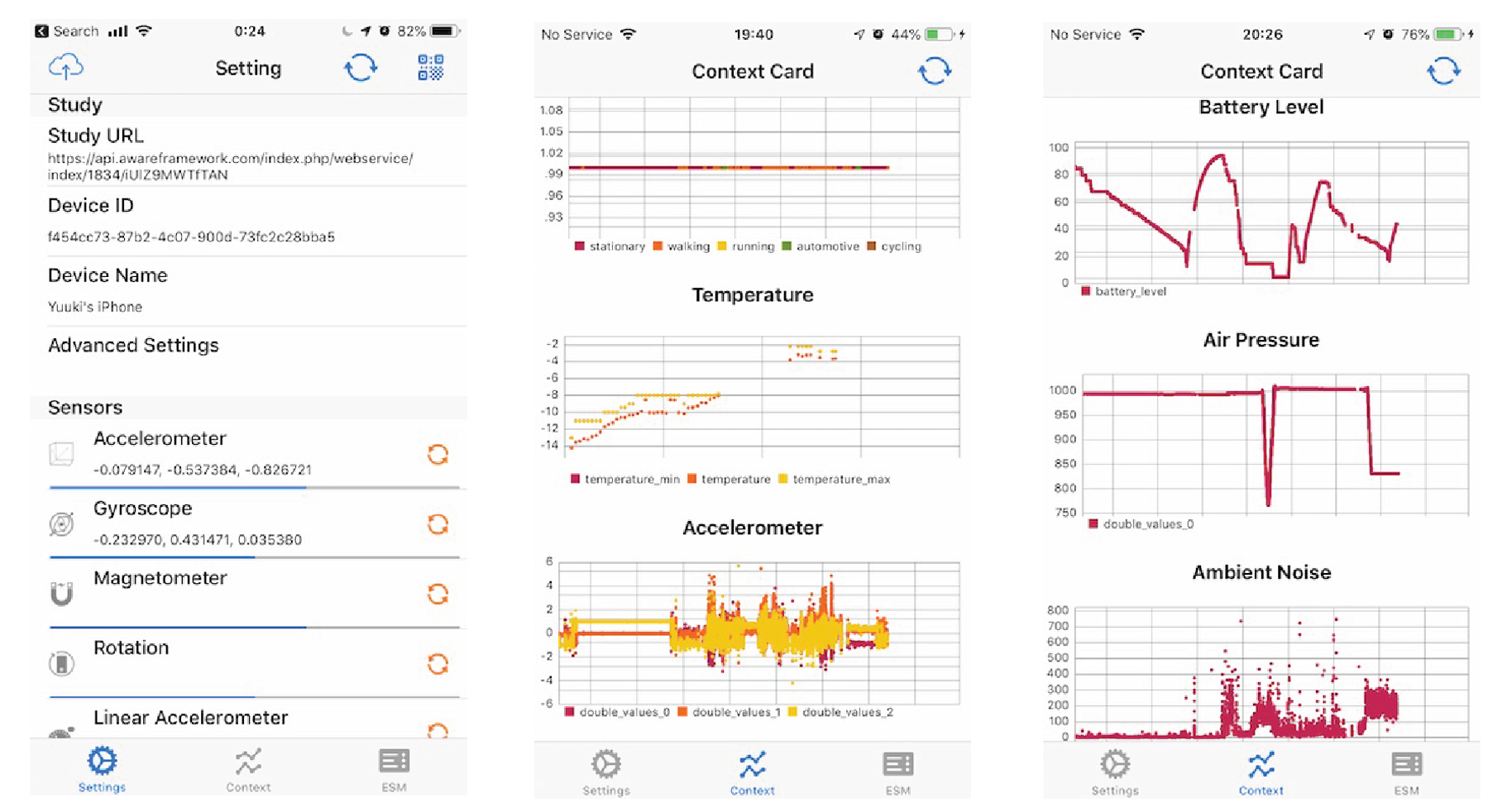
Treatment and disease tracking method
Sensors in mobile devices have the potential to be used effectively to track a variety of medical conditions. This research projects are working with medical institutions to apply mobile sensing technology to disease treatment, symptom tracking, and medication support.
- [Drug and Alcohol Dependence | Journal] Mobile phone sensor-based detection of subjective cannabis intoxication in young adults: A feasibility study in real-world settings (Collaborative work with Prof. Sang Won Base)
- [JMIR Mhealth Uhealth] Mobile Assessment of Acute Effects of Marijuana on Cognitive Functioning in Young Adults: Observational Study (Collaborative work with Prof. Sang Won Base)
- [JMIR Mhealth Uhealth] Smartphone-Based Monitoring of Parkinson Disease: Quasi-Experimental Study to Quantify Hand Tremor Severity and Medication Effectiveness (Collaborative work with Dr. Elina Kuosmanen)
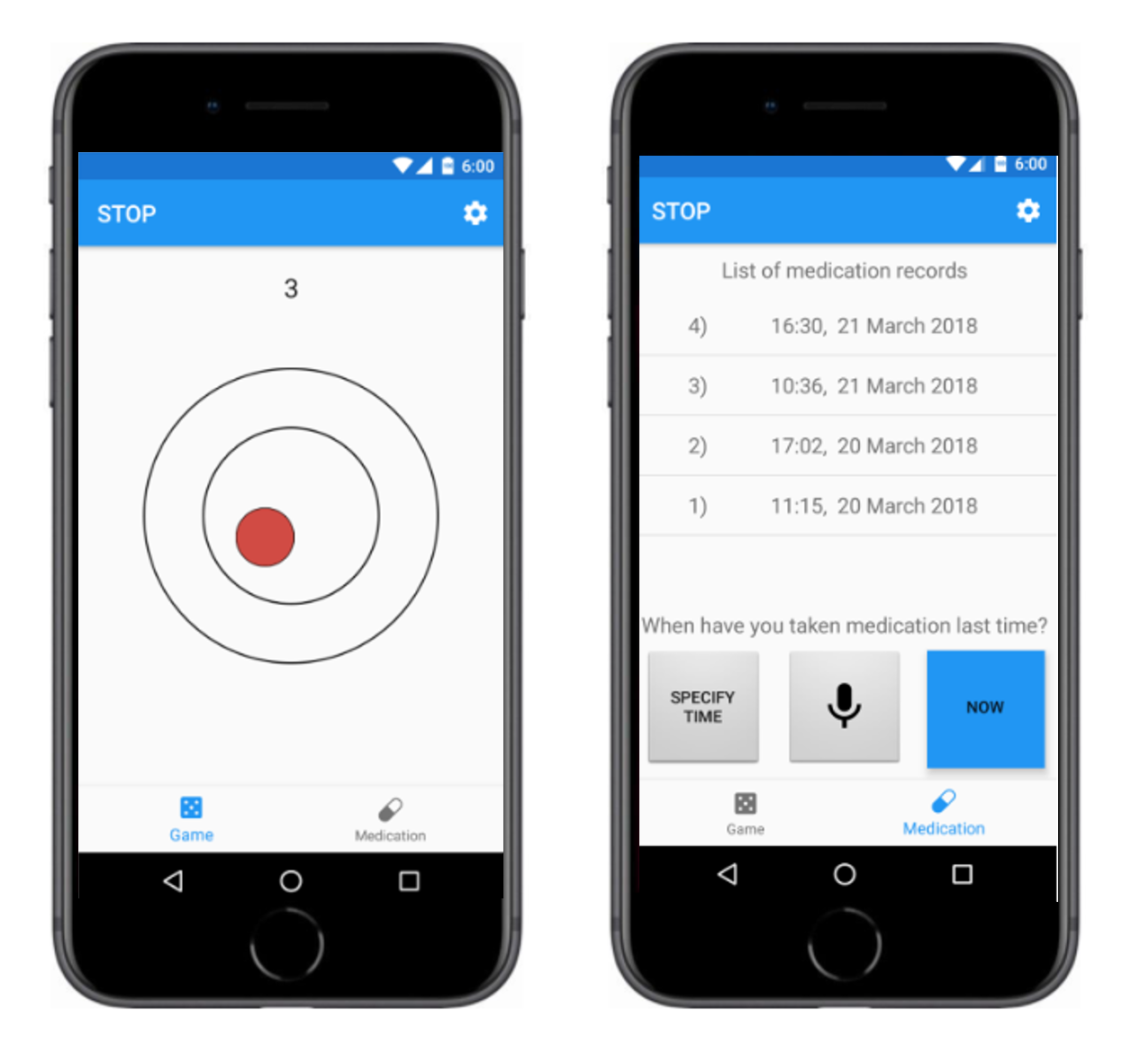
Supplication
Supplication (Supplement + Application) Platform is a platform for enhancing and measuring team-level behavior change using information sharing among team members in the ubiquitous environment for the first time. As an intervention method for a team, Sapplication Platform can share lifelog data via six types of information sharing models that are based on the “competition” and “collaboration” techniques on existing researches.
- [IEEE JBHI] Toward Health Exercise Behavior Change for Teams Using Lifelog Sharing Models
- [IEEE HealthCom ’14] Towards health exercise behavior change for teams using life-logging
- [IPSJ Journal] HealthyStadium: Meal Photo SNS with Mutual Healthiness Evaluation for Improving Users’ Eating Habits

Passed Projects
Detecting infection prevention behaviors
Preventive behaviors against infectious diseases, such as wearing masks, washing hands, disinfecting, and avoiding crowds, are effective ways to reduce the risk of infection during an epidemic. In this research project, these infection prevention behaviors will be robustly detected using commercially available wearable devices, and an infrastructure will be established that can be used in a variety of just-in-time applications.
- [HCII ’23] Detecting hand hygienic behaviors in-the-wild using a microphone and motion sensor on a smartwatch
- [IEEE HealthCom ’22] Detecting Face-Mask Wearing Status Using Motion Sensors in Commercially Available Smartwatches
- [IEEE SmartComp ’22 (Poster)] Toward Measuring Conversation Duration Using a Wristwatch-type Wearable Device
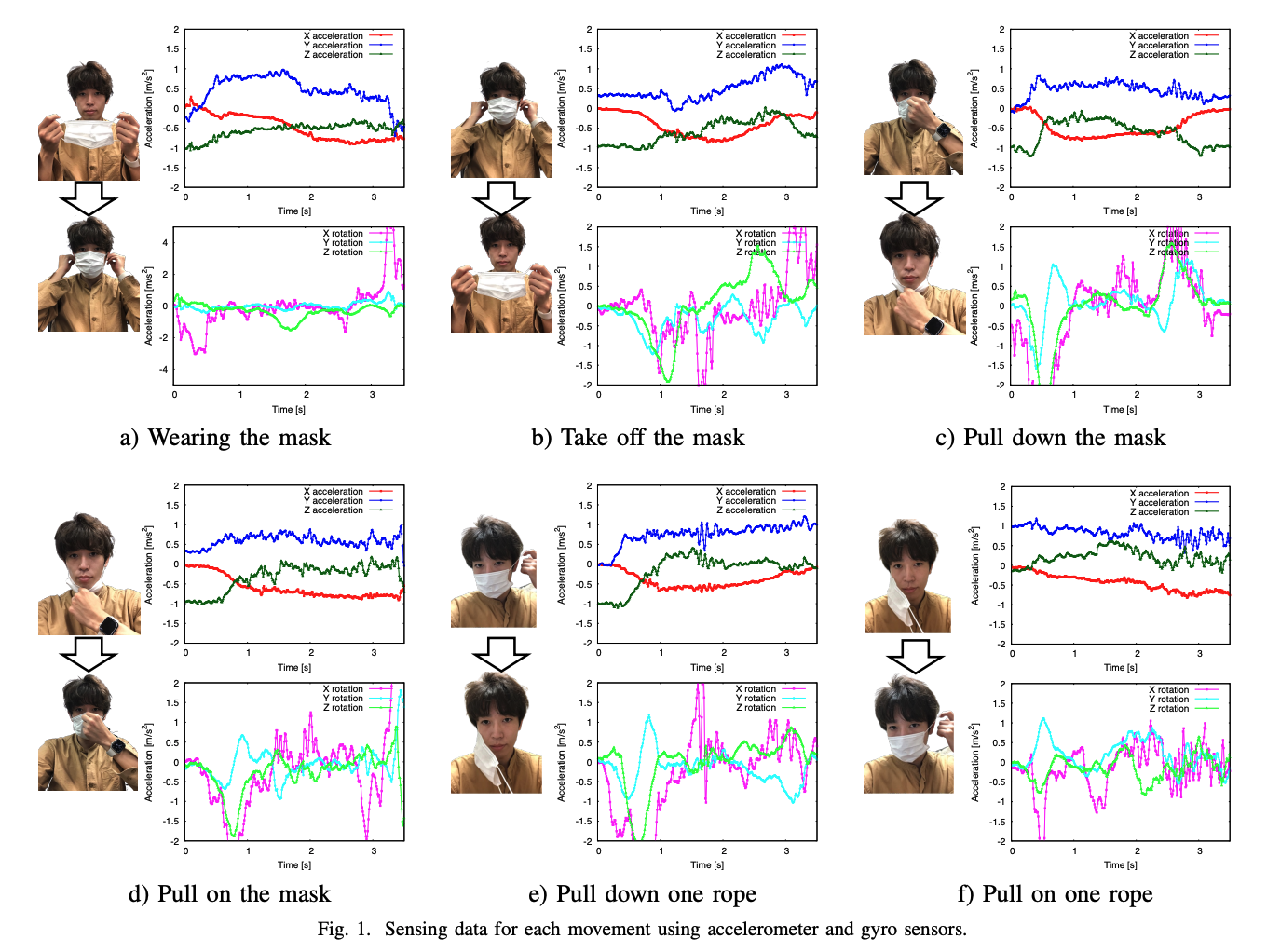
Senbay Kit
The platform embeds collected sensor data into a video frame using an animated two-dimensional barcode using real-time video processing. The video-embedded sensor data, Senbay Video, can be easily restreamed to other people and applications. Our performance evaluations and case studies show that the Senbay makes it much easier to collect and share time-synchronous sensor and video data. SenbayKit support iOS, Android, macOS, Unix-based OS, and web-browser.
- [ACM MobiHCI ’18 (Demo)] Senbay: a platform for instantly capturing, integrating, and restreaming of synchronized multiple sensor-data stream (Honorable Mention Award)
- [ACM UbiComp ’15 (Poster)] Senbay: Smartphone-Based Activity Capturing and Sharing Using Sensor-Federated Video
- GitHub: https://github.com/tetujin/SenbayKit
SelfGuard
SelfGuard is a self-tracking application for recording daily activities such as visited places, a range of mobility, and duration. This application automatically records these data by using location sensors just by putting a smartphone into a pocket during a day. In addition, each user can record the condition of visited places (closed places, crowds, and close contact), and just by taps.
- [HCII ’22] Enhancing Self-Protection: What Influences Human’s Epidemic Prevention Behavior during the COVID-19 Pandemic
- [ACM SenSys 19′ (Poster)] SelfGuard: semi-automated activity tracking for enhancing self-protection against the COVID-19 pandemic
Happy Board
Platform for Mutual Watch-Over among the Elderly Using PAN and Gamification
HappyBoard is a platform for realizing a mutual watch over the elderly in the local community and demonstrated its effectiveness through about 10 months of experiments. In the platform, mutual watching was realized by acquiring health information from Personal Area Network, shooting and sharing smile images using smartphones, and gaming by mission, score, ranking.
Aaron
Promoting Team-level Behavior Change by Lifelog Sharing
Beyond exercise behavior change of individual users, our research focus is on the behavior change of teams, based on lifelogging technologies and lifelog sharing. In this paper, we propose and evaluate six different types of lifelog sharing models among team members for their exercise promotion, leveraging the concepts of “competition” and “collaboration.”
Ripken
Preventing Baseball Players’ Throwing-related Injury using a Wearable Motion Sensor on an Elbow
Baseball players are susceptible to shoulder and elbow injuries due to having an inappropriate throwing form and overload. In this research, we developed an algorithm for detecting inappropriate throwing form using a wearable motion sensor on an elbow. The algorithm can be applied not only for recording a count of throws but also real-time feedback for preventing injury in practices and games.
